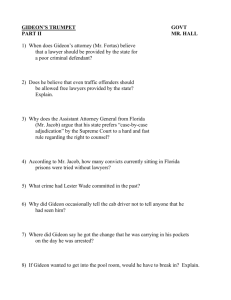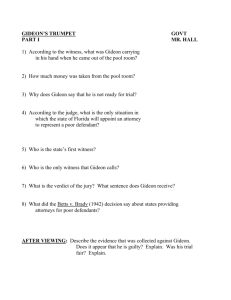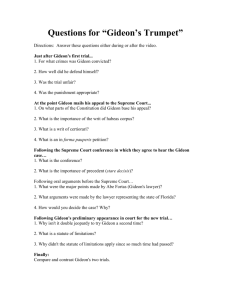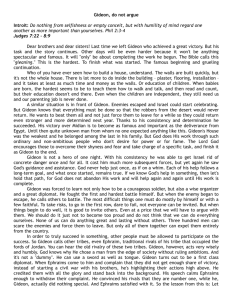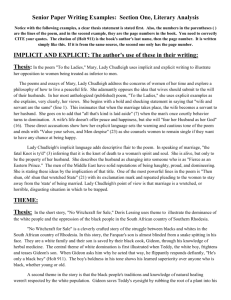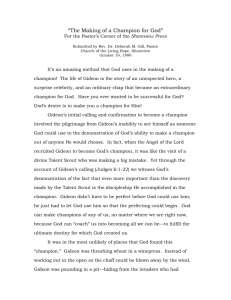Gideon`s Trumpet
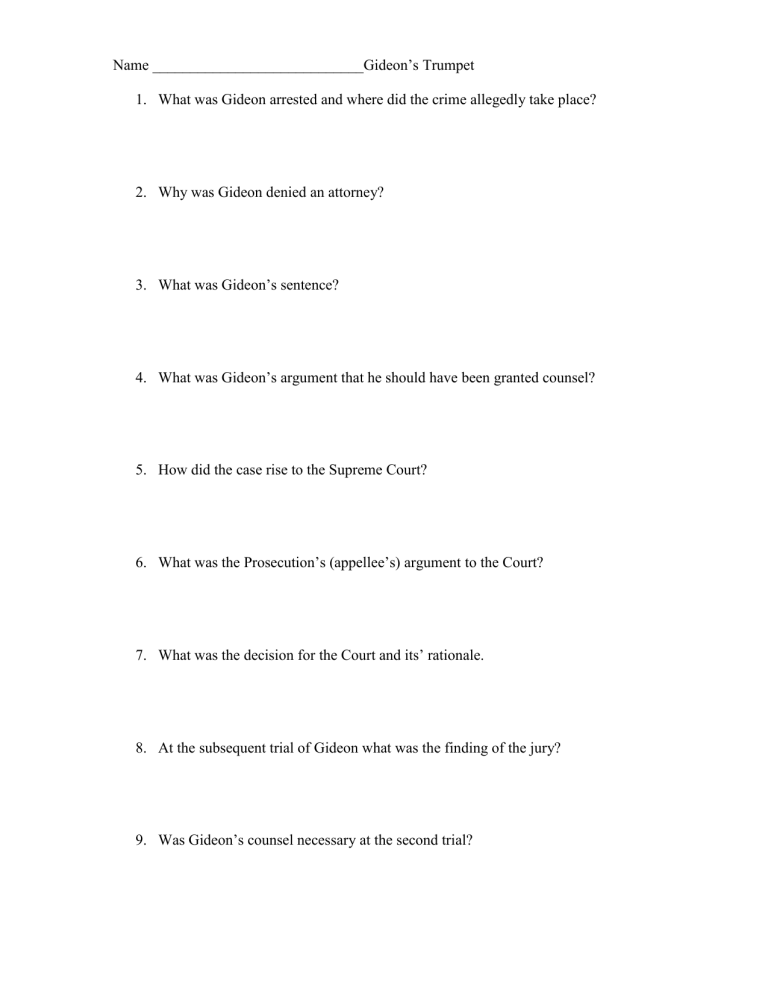
Name ____________________________Gideon’s Trumpet
1.
What was Gideon arrested and where did the crime allegedly take place?
2.
Why was Gideon denied an attorney?
3.
What was Gideon’s sentence?
4.
What was Gideon’s argument that he should have been granted counsel?
5.
How did the case rise to the Supreme Court?
6.
What was the Prosecution’s (appellee’s) argument to the Court?
7.
What was the decision for the Court and its’ rationale.
8.
At the subsequent trial of Gideon what was the finding of the jury?
9.
Was Gideon’s counsel necessary at the second trial?
10.
Read the attached article by Anthony Lewis, updating his book Gideon’s Trumpet forty plus years after Gideon won his Constitutional right. What is the point of
Lewis’ update and provided Lewis is correct, what are remedies you’d suggest for the Court?
The Silencing of Gideon's Trumpet
April 20, 2003
The Silencing of Gideon's Trumpet
By ANTHONY LEWIS
Forty-one years ago, a poor, isolated prisoner in Florida, the least
influential of Americans, wrote a letter to the Supreme Court -- a letter
in pencil, on lined prison paper -- claiming that he had been wrongly
denied the right to a lawyer when he was convicted. The Supreme Court
agreed to hear his case and found that the Constitution required counsel
to be provided in all serious criminal cases for defendants too poor to
hire their own. Clarence Earl Gideon would have a new trial, this time
with a lawyer.
The new jury found him not guilty: a happy ending not only for him but
also for the principle that a lawyer's help is crucial for criminal
defendants.
After the Supreme Court decision, I recognized that it would be, as I
wrote then, ''an enormous social task to bring to life the dream of Gideon
v. Wainwright -- the dream of a vast, diverse country in which every man
charged with crime will be capably defended . . . sure of the support
needed to make an adequate defense.'' On this 40th anniversary, how have
we done? I take my answer from a recent paper by Bruce Jacob, the lawyer
who represented the State of Florida in the Supreme Court, arguing against
Gideon's claim of a right to counsel. ''I hoped that legislatures would
meet the challenge,'' Jacob wrote. ''That was at a time in my life when I
still believed that legislators want to do the right thing. . . . The
record of the courts in fulfilling the hopes represented by Gideon is a
dismal one.''
I was covering the Supreme Court when it decided Gideon v. Wainright, and
the case has always had special meaning for me. It is painful to hear
Bruce Jacob express disappointment at today's courtroom inadequacies. Even
more alarming is the assertion by the Bush administration that in a whole
new class of cases it can deny the right to counsel altogether. Those are
the cases of American citizens designated by Bush as ''enemy combatants.''
One of them is Jose Padilla, born in Brooklyn in 1970 and arrested by
federal agents last May at O'Hare International Airport in Chicago. The
administration claims that it can hold Padilla in solitary confinement
indefinitely, without trial and without access to a lawyer.
Bruce Jacob's judgment rests on endless failures to bring the promise of
Gideon to life. Many states and localities offer not even the minimal
level of financial support needed for an adequate defense. And far too
often the lawyers provided for indigent defendants have not met the barest
standards of competence. Take the case of the sleeping lawyer. Calvin
Burdine was on trial for his life in Texas when his appointed counsel, Joe
Frank Cannon, fell asleep several times during the trial. The Texas Court
of Criminal Appeals held that that was no reason to set aside Burdine's
conviction. The United States Court of Appeals, considering the issue on
habeas corpus, disagreed, but only by a vote of 9 to 5. That is, five of
those distinguished federal judges thought a lawyer who fell asleep during
a capital trial did not do enough harm to matter.
The truth of the proposition that a lawyer is essential was vividly
demonstrated to me by something that happened in Gideon's second trial.
Gideon had been charged with breaking and entering the Bay Harbor Poolroom
in Panama City, Fla., in the early morning hours and taking some coins and
wine. At his first trial, a taxi driver, Preston Bray, testified that
Gideon had telephoned him and that he had gone to the poolroom and picked
him up. When he got into the cab, Bray said, Gideon told him not to tell
anyone about it. That was damaging testimony. And Gideon, without a
lawyer, let it stand without any cross-examination.
In the second trial, Gideon had a lawyer: Fred Turner. After Preston Bray
testified again that Gideon had told him not to say anything about picking
him up that morning, Turner asked whether Gideon had ever said that to him
before. The taxi driver answered, yes, Gideon said that every time he
called a cab. ''Why?'' ''I understand it was his wife -- he had trouble
with his wife.''
Nothing could demonstrate more clearly the value of having a lawyer. But
we know now that it has to be a competent lawyer. Fred Turner was
competent, and then some. He not only destroyed the taxi driver's evidence
against Gideon. He destroyed the chief prosecution witness, one Henry
Cook, who said he had seen Gideon near the time of the break-in. Turner
suggested to the jury that it was really Cook himself who had committed
the crime. He was in a good position to speak about Cook because he had
represented Cook in two other cases.
Lawyers themselves bear some of the responsibility for the failures since
the Gideon decision. Of the 13 people on death row in Illinois released
between 1987 and 2000 after they were found innocent, four had been
represented by lawyers who were later disbarred or suspended from
practice. But so do the authorities who pick indifferent, sleepy,
incompetent lawyers to defend men and women on matters as serious as life
and death. Calvin Burdine's lawyer, Joe Frank Cannon, was appointed by
judges in Houston to other cases after he slept through Burdine's trial.
In Texas and other places, some appointments of counsel are regarded as
sinecures to be given to friends and supporters.
Then there is the question of resources. Even a competent lawyer may not
be able to mount an adequate defense against the state, with all its
resources, if he has next to nothing for investigation and effectively
works for starvation wages. Bobby Houston spent 19 months in jail in
Indianapolis without ever being tried, four of them after the charge
against him, child molesting, had been dismissed. The public defender
handling his case never told him, or told the prison authorities, about
the dismissal.
We can surely say that Houston's lawyer lacked due diligence. But politics
and money were also involved. At the time of the case, public defenders in
Marion County, Ind. -- working part time or more than part time -- were
paid $20,800 a year, plus $60 a month for all office expenses. They were
so grossly underpaid and overworked that many could not even accept
collect calls.
Why does the dream of the Gideon decision -- the dream of a country in
which every person charged with crime will be capably defended -- remain
just that, a dream? Why do judges countenance mockeries of legal
representation? Why do we, the citizens, tolerate such unfairness? These
are profound questions, and I can do no more than speculate on possible
explanations.
One answer is plain. Criminal defendants and prisoners have little or no
political power. Legislators see no votes in assigning competent lawyers
for poor defendants or giving lawyers the resources to do their job
properly. The Clarence Earl Gideons of this world are constituents who can
safely be ignored. Many are barred from voting, and the rest seldom
bother.
There is more to it than defendants' and prisoners' lack of political
power. This country differs from all other Western countries in its
attitude toward crime and criminals. We are tough on crime, as the
advocates of harsh measures put it. Critics might use a stronger term,
like ''brutal.'' American prisons tend to be more unpleasant than they are
elsewhere; sentences, much longer. And of course we impose the death
penalty, which has been abandoned everywhere else in the trans-Atlantic
world as a savage relic. Why the United States takes so different a view
of how to treat criminals is a question too deep for exploration here. But
there is no doubt that the harsh view exists, exacerbated by politicians,
starting with Richard Nixon and his ''war on crime.''
Manifestations of this harshness are widespread. The United States Court
of Appeals for the Eighth Circuit recently approved the involuntary
administration of antipsychotic drugs to a death-row inmate so he could be
made sane enough to be executed. Then there was the prosecutor who argued
that an execution should proceed even if the prisoner were to offer
last-minute DNA evidence of his innocence.
DNA is at the center of an extraordinary recent development that sheds
some light on attitudes toward criminal justice. The discovery of
incompetence -- or worse -- at the Houston Police crime laboratory in
recent months may affect hundreds of prosecutions in Harris County, where
Houston is located, including many capital cases. More defendants from
Harris County have been executed than from any other county in the United
States. Now it turns out that the work of the laboratory is suspect. What
about the defense lawyers? Many simply did not have the resources to check
the authenticity of the evidence that sent their clients to jail -- or to
death.
Among them were the lawyers for Josiah Sutton, convicted of rape four
years ago and prosecuted in part on the basis of a DNA report from the
Houston lab. After a Houston television station raised questions about the
laboratory last fall, the sample used to help convict Sutton was retested
by an independent laboratory in Houston, which found that it did not match
Sutton's DNA.
The case of Josiah Sutton and the Houston crime lab is one more proof of
what Justice Black told us in Gideon: when the state brings its weight
down on an individual, he or she cannot get justice without the help --
the effective help -- of a lawyer. That is a fundamental truth, an obvious
truth, as Black said. But on the anniversary of the decision in Gideon v.
Wainwright, that truth is being challenged in a way that I did not believe
was possible in our country.
In two cases now before the courts, Attorney General John Ashcroft is
asserting that President Bush has the power to detain any American citizen
indefinitely, in solitary confinement, without access to a lawyer, if he,
the president, designates the detainee an ''enemy combatant.'' The
detainee cannot effectively challenge that designation. A court may hold a
habeas corpus proceeding, but the government need produce only its own
assertions of evidence, not subject to cross-examination. ''Some
evidence'' will suffice -- that is, any evidence, however unchecked and
second-hand. That is the claim being made by the law officers of the
United States.
I would not have believed that an attorney general would argue that an
American could be held indefinitely without being able to speak to a
lawyer. I seriously doubt that any attorney general in the years since
Gideon, except the present occupant of the office, would have made that
claim.
One of the pending cases concerns Jose Padilla, who became a gang member,
was arrested half a dozen times and served several jail sentences. He
became a Muslim. After traveling, in Pakistan among other places, Padilla
flew into O'Hare Airport last May 8 and was arrested by federal agents. He
was first detained as a material witness before a New York federal grand
jury investigating the Sept. 11 terrorist attack on the World Trade
Center. A judge appointed a lawyer for him and set a hearing for June 11.
But on June 10 Ashcroft, who happened to be in Moscow, made a televised
statement about Padilla. ''We have captured a known terrorist,'' Ashcroft
said. His arrest ''disrupted an unfolding terrorist plot to attack the
United States by exploding a radioactive 'dirty bomb.''' There has been no
way for Padilla, or his lawyer, to challenge that statement, or for the
news media to test its truth. It was a conviction by government
announcement.
Padilla is confined in a Navy brig in South Carolina. The lawyer
originally appointed to represent him in the material witness proceeding,
Donna R. Newman, has been trying to see him -- without success. A federal
judge, Michael Mukasey, decided that she should have a chance to talk with
him for the limited purpose of examining the evidence produced by the
government in support of his designation as an ''enemy combatant.'' But
that decision was challenged anew by government lawyers.
They offered an affidavit by the director of the Defense Intelligence
Agency, Vice Adm. Lowell E. Jacoby. He said successful interrogation of a
prisoner depends largely on ''creating an atmosphere of dependency and
trust between the subject and interrogator. Developing the kind of
relationship . . . necessary for effective interrogations . . . can take a
significant amount of time. There are numerous examples of situations
where interrogators have been unable to obtain valuable intelligence from
a subject until months, or even years, after the interrogation process
began.'' Admiral Jacoby said any access to counsel, however brief, ''can
undo months of work and may permanently shut down the interrogation
process.''
There is a certain paradox in Admiral Jacoby's affidavit. The very fact
that extended interrogation in the absence of counsel may break a
subject's will is one reason that the right to counsel is guaranteed in
the criminal law. It is the basis of the Miranda rule.
The government argues, and in the other ''enemy combatant'' case the
United States Court of Appeals for the Fourth Circuit agreed, that the
Sixth Amendment's guarantee of the right to counsel ''in all criminal
prosecutions'' does not apply because Padilla is not being prosecuted. In
other words, the government can hold an American in prison for life
without letting him see a lawyer if it takes care not to charge him with a
crime and try him. James Madison and the others who added the Sixth
Amendment and the rest of the Bill of Rights to the Constitution in 1791
would surely have regarded that argument as sophistry.
Bruce Jacob has served on both the defense and the prosecution side of
criminal justice. Forty years after Gideon v. Wainwright was decided, he
takes a broad view of the constitutional right to counsel. It should
include civil as well as criminal proceedings, he says in his paper: ''The
due process and equal protection clauses do not differentiate between
criminal and civil cases.'' Paraphrasing Black's opinion, Jacob concludes:
''Certainly any person haled into court or brought before any tribunal,
whether criminal, civil or administrative. . . should, if indigent, be
afforded counsel at public expense.'' With an eye on the enemy combatant
cases, I would amend that statement to include any person deprived of his
liberty by the state.
Clarence Earl Gideon was not a clear thinker, a man of the world or, least
of all, an easy person to deal with. He was a petty criminal, a habitual
one, worn out beyond his years by a difficult life. But he knew what he
wanted. He turned down the first two lawyers offered him, when it came
time for his second trial. He wanted Fred Turner, and that was a wise
choice.
Fred Turner told Bruce Jacob that Gideon came to him with ''a valise full
of motions.'' Among other things, he wanted to move for a change of venue,
to Tallahassee. Turner pointed out that he knew people in Panama City --
in fact, he knew most of the jurors -- but none in Tallahassee. Gideon
agreed to drop the idea of a change of venue. Then Turner told him, ''I'll
only represent you if you will stop trying to be the lawyer and let me
handle the case.'' Gideon agreed.
Clarence Gideon, who died in 1972, would be disappointed today at the
imperfect realization of his dream. He would regret especially, I think,
the failure of the Supreme Court to hold that the Constitution requires a
meaningfully competent lawyer for the poor defendant -- the court's
countenancing, even in capital cases, of lawyers who scarcely go through
the motions while their clients are convicted.
On the other hand, the Supreme Court has held fast to the principle that
the right to consult a lawyer is, as Justice Black said, ''fundamental.''
It is a far more conservative court than the one that decided the Gideon
case, with William Rehnquist as chief justice instead of Earl Warren. It
has overruled or narrowed many precedents. But it has repeatedly
reaffirmed its holding in Gideon v. Wainwright.
That is what makes the Bush administration's claim in the ''enemy
combatant'' cases so extraordinary. Of course, Jose Padilla and the other
man being held, Yasser Esam Hamdi, are not in precisely Gideon's position.
They are not being prosecuted; they are being held indefinitely, without
charges, in solitary confinement. They are not looking for counsel; they
both already have lawyers, highly competent ones appointed by federal
judges. But they are not allowed to talk to them. Those differences from
Gideon's situation seem to make their need to consult the lawyers they
have, if anything, more compelling.
The constitutional argument made by Ashcroft and his aides also seems
imperfect. Perhaps the Sixth Amendment guarantee of counsel ''in all
criminal prosecutions'' can be reasoned away as inapplicable to indefinite
detention without charge, though I think the framers would have been
astonished at the invention of a severe penalty for a suspect with fewer
rights than he would have as a criminal defendant.
But the Constitution also includes the Fifth Amendment. It provides that
''no person shall . . . be deprived of life, liberty or property, without
due process of law.'' Jose Padilla has been deprived of his liberty --
forever, for all he knows. Has he had due process of law?
The Bush administration's answer to that question is essentially this: in
a war against terrorism, any process that the president says is essential
to the war is due process. Government lawyers argue that in wartime,
courts must defer to the president's judgment.
The denial of counsel to Jose Padilla, then, is an aspect of something
larger. About the time the Gideon case was decided, we began to hear about
the imperial presidency. The terrorist attacks of Sept. 11, 2001, and now
the war on Iraq have renewed that concept in even more extreme form. Bush
has little trouble with a supine Congress. He wants the Constitution, too,
as our judges enforce it, to yield to the supremacy of the president.
Anthony Lewis is a former New York Times columnist and the author of
''Gideon's Trumpet.''
Copyright 2003 The New York Times Company |
